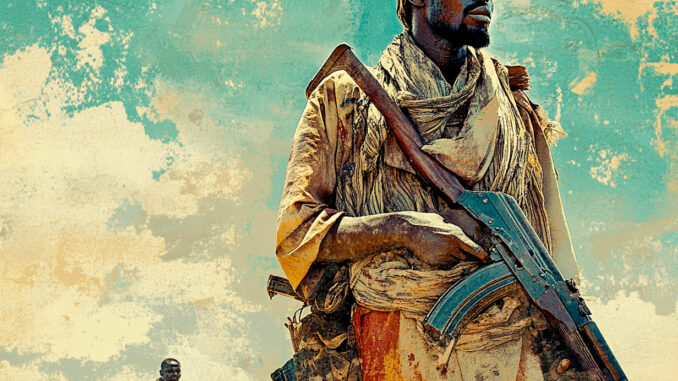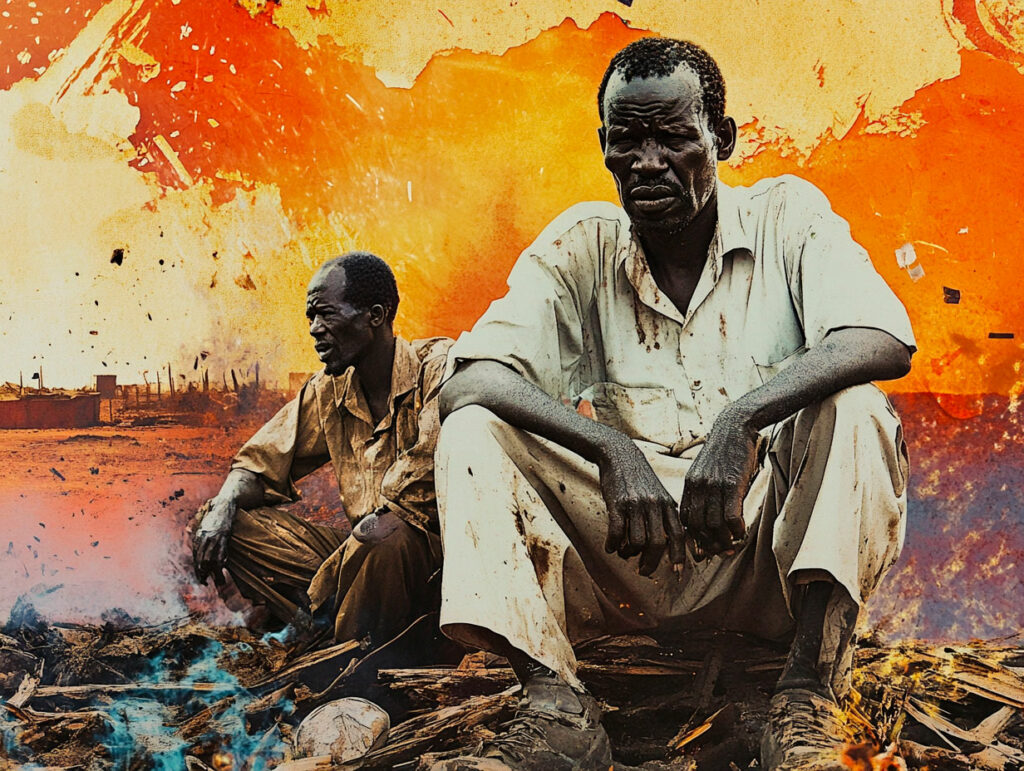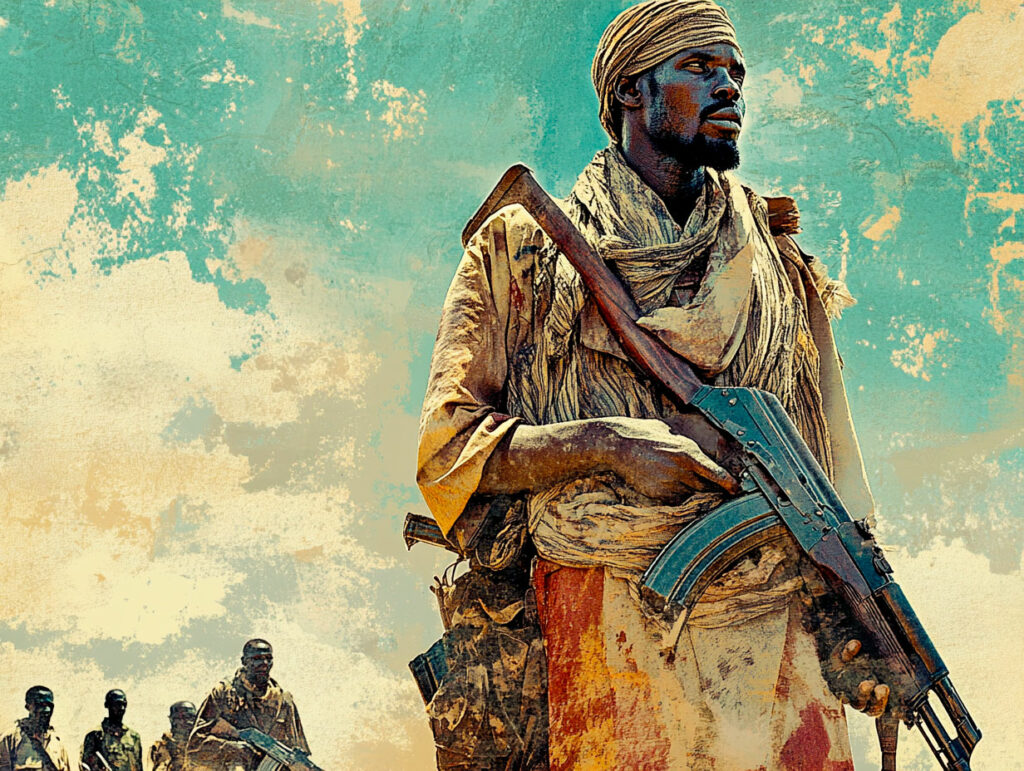
The situation in Sudan is deteriorating: armed conflict, 70,000 dead, extreme corruption, economy in crisis, aid plundered, peace uncertain
The current situation in Sudan is the result of a series of political, military and economic tensions. Since April 2023, the Rapid Support Forces (RSF) have been fighting the regular Sudanese army, aggravating a crisis rooted in the period of Omar al-Bashir’s dictatorship (1989-2019). Attempts at mediation, notably via the Sovereign National Council (SNC), have failed. The human toll is heavy: some 70,000 deaths linked to the clashes, hundreds of thousands displaced and an economy that is faltering. Humanitarian aid is regularly diverted, exacerbating food shortages.
The historical links between the RSF, heirs to the Janjaweed militias, and the Darfur region illustrate decades of ethnic and political tensions. International indicators, such as the corruption perception index published by Transparency International, rank Sudan and South Sudan among the worst in the world in this respect.
On the diplomatic front, Sudan’s removal from the US list of state sponsors of terrorism (SST) in 2020 offered hope of a turnaround, not least thanks to improved relations with Israel. Easier access to technology, investment and foreign aid was envisaged. These hopes were largely dashed by the resumption of fighting. The current conflict is plunging the Sudanese population into a persistent cycle of insecurity and food crisis, severely limiting the prospects for lasting reconstruction.
Political background and formation of the SNC
The current situation in Sudan is rooted in a long history of conflict and military rule. For several decades, this East African country has faced recurrent regime changes and internal tensions. One of the milestones was the prolonged period under Omar al-Bashir, in power from 1989 to 2019. During these 30 years, the policies pursued fostered internal divisions, leading to armed clashes and the crumbling of civil institutions. These dynamics have played a central role in creating a highly fragile political situation, where attempts at democratization come up against complex military realities.
Following the fall of Omar al-Bashir in 2019, many national actors hoped for a gradual return to a more inclusive system. It was in this context that the Sovereign National Council (SNC) was born, a structure made up of civilian and military players, designed to oversee a political transition. The aim of this transition was to ease tensions, reform institutions and lay the foundations for more representative governance. In theory, the SNC was intended to promote measures aimed at restoring democratic governance, implementing institutional reforms and preparing for free elections. However, from the outset, this process was hampered by a lack of mutual trust between civilians and the military, making concrete progress difficult.
From October 2023 onwards, the differences between the stakeholders intensified. Ambitions for far-reaching reforms were compromised, as the military often sought to preserve its strategic and economic interests, while civilians sought solid institutional guarantees. The SNC, intended as a negotiating platform, rapidly reached a standstill. The end of this dialogue led to a context of widespread mistrust. Some pro-reform civilians saw the military takeover as a clear threat of a return to an authoritarian system akin to that of Omar al-Bashir.
This political impasse has left the country in a state of uncertainty. Without a consensual political framework, the resumption of armed clashes intensified. Instead of leading to normalization, the SNC was perceived by many observers as a blocked political space. The failure of this forum thus contributed to the deterioration of Sudan’s internal stability, precipitating the country towards its current crisis.

The human, economic and aid impact
Since the resumption of hostilities in April 2023 between the Sudanese Armed Forces and the RSF, the humanitarian situation has deteriorated sharply. According to various estimates available on the ground, the fighting has left almost 70,000 people dead, including civilians. This approximate figure reflects the scale of the violence and raids. Urban and rural populations are faced with intermittent clashes, attacks on civilian infrastructure and the gradual dismantling of essential food distribution networks. Internally displaced persons now number in the hundreds of thousands, fleeing combat zones to find precarious shelter in theoretically safer regions.
The crisis is also economic. Before 2023, Sudan had planned a phase of reconstruction, reform and internal reconciliation to foster stability. However, recent fighting has called these prospects into question. Political instability has considerably reduced the flow of foreign investment. Unemployment has risen, affecting many sectors, from small-scale commerce to the agricultural industry. Regional markets are suffering from rising prices, making access to food increasingly difficult. Shortages are multiplying, and local populations are struggling to acquire basic necessities. For example, the price of a 90 kg sack of sorghum, a staple foodstuff, can reach several tens of euros, an unsustainable amount for most households.
In addition, humanitarian aid, a crucial element for a fragile population, is regularly misappropriated. Various armed groups, including criminal gangs linked to the RSF, appropriate certain shipments of food and medicines. The flow of resources is hampered. Distributions are not carried out properly, rendering aid ineffective. This dynamic is hampering international humanitarian operations, which require minimum security guarantees for personnel and equipment.
At the same time, food crises are on the increase. The agricultural sector, already under strain, is seeing its productivity plummet due to a lack of resources, investment and peace of mind. This is forcing a growing proportion of the population to depend on costly imports or sporadic distributions, aggravating an overall situation of vulnerability. Without political and security stabilization, there can be no lasting improvement. The Sudanese economy thus finds itself locked in a spiral of scarcity, unemployment and humanitarian dependence, profoundly altering the social fabric and resilience of local communities.
The role of the RSF, origins and transformations
The Rapid Support Forces (RSF), formerly known as Janjaweed, are a key player in the current situation in Sudan. Historically, the Janjaweed militias first appeared in the 1980s, operating mainly in the Darfur region of western Sudan. At the time, they were already involved in cross-border clashes, notably in Chad and Libya, before refocusing on Darfur towards the end of the 1980s. Their modus operandi was based on raids, violent acts against civilian populations and punitive operations, often carried out against black African communities perceived as resisting central authority.
In 2013, the Janjaweed took the name RSF, institutionalizing themselves within the Sudanese government’s security apparatus. These paramilitary forces, financed and equipped by the state, have become an instrument of territorial and political control in Darfur, terrorizing local populations and ensuring central government control over a historically unstable region. Their role has thus been formalized in the repression of rebel groups and the maintenance of order imposed by Khartoum.
In 2023, a breaking point was reached when the Sudanese government proposed integrating the RSF into the regular army. The RSF refused, seeing this initiative as a challenge to their autonomy, prerogatives and influence. The open confrontation in April 2023 between the army and the RSF illustrated the strength acquired by the latter over the years. The RSF have modern weaponry, extensive logistical resources and a foothold in certain segments of the local economy. This enables them to take on the army, making the situation even more complex.
The current conflict between the army and the RSF has major implications for the country’s stability. The difficulty of reintegrating the RSF into traditional military structures highlights the fragmentation of the Sudanese security apparatus. Local communities, already weakened, find themselves at the heart of a field of confrontation between two competing armed entities. This militarized context is preventing the restoration of state authority throughout the country. The challenge now is to reduce the harmful role played by these paramilitary groups, so as to enable the peace process, which is already compromised, to proceed, and to limit attacks on the fundamental rights of the civilian population.
Corruption, slavery and international ranking
Transparency International’s Corruption Perceptions Index ranks Sudan and South Sudan among the most corrupt countries in the world. According to the 2022 ranking, South Sudan occupies 177ᵉ place out of 180, while Sudan is around 162ᵉ place. This situation hampers any attempt to improve living conditions. Already fragile governance mechanisms give way to informal operations, embezzlement and economic privileges granted to certain armed or political groups. Corruption also affects the distribution of humanitarian aid, compromised by the systematic siphoning off of resources. Medicines, food and technical equipment often disappear before reaching the target communities.
Alongside this problem, a persistent phenomenon contributes to the deterioration of Sudan’s image on the international scene: the continuation of slavery. Since the 1990s, Arabized militias have been encouraged to carry out raids against non-Muslim African groups, resulting in the capture of enslaved people. This practice, deeply rooted in certain circles, sometimes emerges in the international news, revealing a tragic dynamic. Militiamen may resell people in exchange for goods, or exploit them as laborers. In some cases, the phenomenon extends beyond Sudan’s borders. There are reports of terrorist groups, such as al-Qaeda in the Sahel, taking captives on strategic retreats, as in Mali. This system maintains a climate of terror and dehumanization, discouraging stabilization.
These practices, corruption and slavery, weigh heavily on the country’s international integration. Potential investors fear a faulty legal system, opaque rules and chronic insecurity. International rankings reflect this reality: higher-ranked countries attract foreign capital more easily, promoting growth, while Sudan stagnates in a zone of uncertainty. Without far-reaching reforms, access to international credit lines, high-performance technologies and commercial partnerships remains limited. The result is a weakened economy, unable to support sustainable development. The current situation can only improve if reliable legal mechanisms are put in place, the players involved are made accountable, and there is a firm political will to eradicate these practices. For the time being, the weight of corruption and the existence of slavery hamper any solid prospect of recovery.

Removal from the SST list and expected effects
In October 2020, Sudan was removed from the US list of State Sponsors of Terrorism (SST). This decision marked the end of 27 years of sanctions and restrictions. Previously, presence on this list prevented Sudan from accessing international funding sources, obtaining advanced technological equipment and benefiting fully from international aid. Trade was limited, which severely hampered economic modernization. For Sudan, removal from the list represented an opportunity to make use of international lending mechanisms, to participate more actively in global economic governance and to expand its domestic market with a wider range of products.
Removal from the ESS also opened the door to reconnection with the rest of the world. Electronic devices, such as computers, smartphones and certain software, are now more accessible. This is essential in a modern economy, where access to new technologies helps boost productivity. Digital tools facilitate infrastructure management, distance learning, access to up-to-date financial data and communication with external partners. This technological access could improve the transparency of exchanges, reduce embezzlement and optimize the distribution of resources, if the political framework allows.
The lifting of these constraints has also paved the way for the normalization of diplomatic and economic relations. The arrival of potential investors was hoped for, as was a strengthening of regional collaboration. However, the resumption of conflict in 2023 jeopardized these prospects. Without stability, economic openness cannot materialize. Foreign investors are cautious about making commitments in an uncertain environment. Despite the country’s removal from the SST list, its potential remains limited. Sudan must re-establish internal security, reduce corrupt practices, stabilize its institutions and guarantee an environment conducive to economic activity. Only then will international normalization take effect, transforming the Sudanese economy over the long term. For the time being, the expected benefits remain theoretical, pending more favorable structural conditions.
Relations with Israel, access to technology and prospects
Following the transition initiated in 2019, Sudan has undertaken to improve its diplomatic relations, notably with Israel. The normalization agreement, discussed after 2020, was intended to consolidate Sudan’s foothold in the international community, as well as secure economic benefits. Recognition of Israel sometimes aroused internal reluctance, including among those attached to democracy, but the hope was to gain leverage to boost investment, security cooperation and access to cutting-edge technologies.
The partnership with Israel was to enable Sudan to accelerate its modernization. The arrival of technical skills, medical equipment, agricultural and industrial technologies could have contributed to the recovery of the local economy. For example, the installation of modern greenhouses, optimized to withstand arid climates, could increase agricultural yields. Agricultural drones and irrigation management tools, available on the international market, are more easily integrated with a network of international partners. Similarly, the health sector could have benefited from more advanced medical equipment, facilitating early detection of disease, pharmaceutical logistics and training of healthcare personnel.
However, the resumption of fighting in April 2023 put these dynamics on hold. State structures, already unstable, can neither provide lasting security for infrastructures nor guarantee the application of agreements. Foreign players, including Israelis, are observing the situation and are reluctant to commit themselves in an unreliable context. The instability makes it difficult to develop pilot projects, agri-food processing plants or modern telecommunications facilities.
Despite this, the opportunities remain, but require global stabilization. In theory, technological cooperation with Israel, the revival of international partnerships and the import of various types of expertise could help Sudan to catch up. Neighbouring countries will be watching this development closely, as Sudan’s stability influences regional trade and the development of trade corridors. In the meantime, without a more secure political environment, this potential will remain untapped. The relationship with Israel is therefore not simply a diplomatic gesture, but also a potential key to medium-term development, subject to the uncertainties of the current context.
War Wings Daily is an independant magazine.